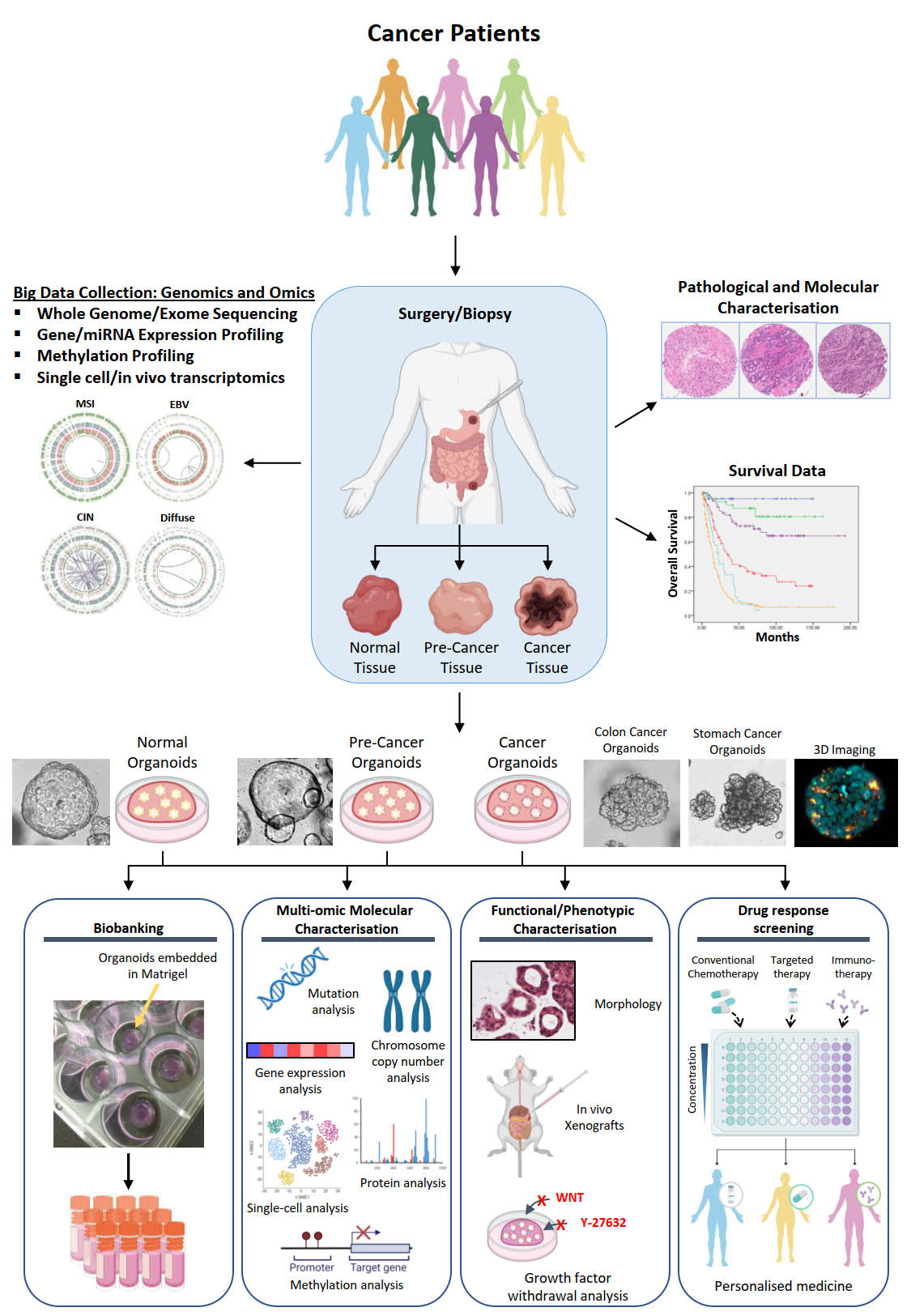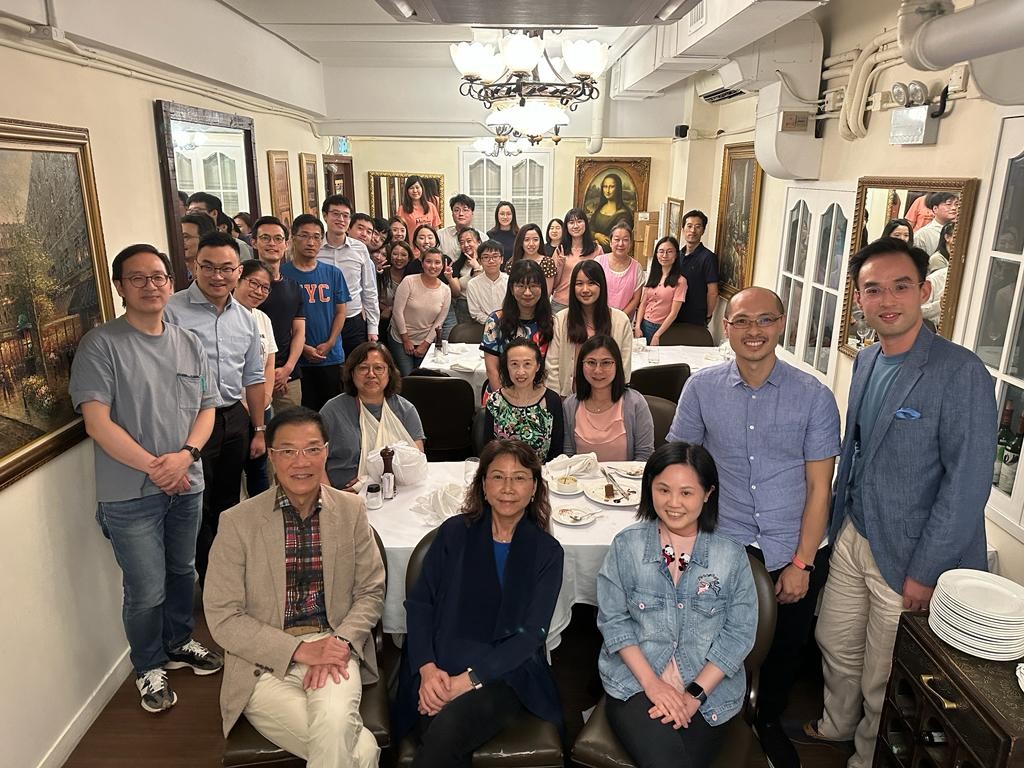Professor LEUNG Suet Yi

Department Chairperson
Chief of Service, Department of Pathology, Queen Mary Hospital
YW Kan Professor in Natural Sciences
Clinical Professor, Chair of Gastrointestinal Cancer Genetics and Genomics
Director, Hereditary Gastrointestinal Cancer Genetic Diagnosis Laboratory
- MBBS (HK), MD (HK), FHKAM (Pathology), FHKCPath, FRCPath (UK), FRCPA
Molecular genetics and genomics of gastrointestinal tract cancer
Clinical Service
Director, Hereditary Gastrointestinal Cancer Genetic Diagnosis Laboratory
Research Description
My research is centred on the molecular genetics and genomics of gastric and colorectal cancers, with a focus on using molecular classification and genetic diagnosis to improve cancer prevention and treatment approaches. In the past, we conducted extensive molecular profiling and integrative genomic analyses on a large number of gastric and colorectal cancers, employing next-generation sequencing, expression microarrays, methylation arrays, and DNA SNP genotyping arrays. Our investigations uncovered the intricate genomic landscape of gastric cancer and led to the identification of numerous novel gastric cancer driver genes, such as frequent mutations of ARID1A in gastric cancers with MSI or EBV, and hotspot mutations of RHOA in diffuse-type gastric cancer. Our integrative genomic analysis exposed molecular subtype-specific patterns of genetic and epigenetic disturbances, many of which converged to target the same key cancer driver genes or pathways.
My team has also created a living biobank of gastric and colon cancer organoids using patient tumour biopsies. This extensive collection of organoids includes different molecular subtypes, key driver gene alterations, disease stages, pre-cancerous and normal organoids. We have conducted thorough morphological and multi-omics analyses on these organoids and are currently employing our biobank for large-scale drug sensitivity screening to facilitate clinical application. Additionally, we have used our organoid biobanks for mechanistic and functional studies with CRISPR/Cas9 gene editing technologies to comprehend the pathways of carcinogenesis. Our organoid biobank, combined with linked genomic data, offers a valuable resource for understanding both cancer biology and anti-cancer drugs, potentially leading to the development of precision cancer therapy. Our approach integrates organoid culture, high-throughput multi-omics, and CRISPR/Cas9 gene editing technologies for use in disease modelling, drug screening, and functional characterization of novel tumour driver genes in gastrointestinal cancers. Based on this research, we have established the Centre for Oncology and Immunology, Ltd., where we seek to translate our research into clinical applications.
Furthermore, our team has investigated the genetic basis of early-onset colorectal cancer (CRC) in Hong Kong and was the first to describe a new inactivation mechanism of MSH2 in Lynch Syndrome (a heritable form of CRC), involving large germline deletions in the EPCAM gene, which is upstream of MSH2. Our discoveries have led to the inclusion of EPCAM deletion in the standard genetic diagnosis protocol for Lynch Syndrome worldwide. We now apply our findings in patient care by offering a charitable genetic diagnosis service, including genetic testing and referral for prophylactic screening for early-onset or familial CRC patients. Our ultimate aim is to enable genome-guided patient stratification, prognostication, and personalized treatment of colorectal and gastric cancers by leveraging genomic technology to identify novel pathways, biomarkers, drug targets, and driver genes of carcinogenesis.
We are actively seeking talented scientists to join our team. If you are interested, please send us your CV for review. We look forward to potentially welcoming you to our team.

Research Grant
- Theme-Based Research Scheme (TBRS)
- Innovation and Technology Commission of HKSAR, under the InnoHealth initiative
- Hong Kong Cancer Fund

Awards and Honors
- YW Kan Endowed Professorship in Natural Sciences (2012)
- Outstanding Women Professionals Award (2014)
- Croucher Senior Medical Research Fellowship (2007)
- Outstanding Researcher Award, The University of Hong Kong (2007)
- Research Output Prize, The University of Hong Kong (2007, 2009, 2019)
- Faculty Outstanding Research Output Award, Li Ka Shing Faculty of Medicine, The University of Hong Kong (2012, 2015, 2017, 2021, 2023)
- Outstanding Young Researcher Award, The University of Hong Kong (2001)
Selected Publications
Click here for detail publication list
- Yue SSK, Tong Y, Siu HC, Ho SL, Law SYK, Tsui WY, Chan D, Huang Y, Chan ASY, Yun SW, Hui HS, Choi J, Hsu MSS, Lai FPL, Chan AS, Yuen ST, Clevers H, Leung SY. Divergent lineage trajectories and genetic landscapes in human gastric intestinal metaplasia organoids associated with early neoplastic progression. Gut. 2024 (in press).
- Yan HHN, Chan AS, Lai FP, Leung SY. Organoid cultures for cancer modeling. Cell Stem Cell. 2023 Jul 6;30(7):917-937.
- Tong Y, Cheng PSW, Or CS, Yue SSK, Siu HC, Ho SL, Law SYK, Tsui WY, Chan D, Ma S, Lee SP, Chan ASY, Chan AS, Yun SW, Hui HS, Yuen ST, Leung SY, Yan HHN. Escape from cell-cell and cell-matrix adhesion dependence underscores disease progression in gastric cancer organoid models. Gut. 2023 Feb;72(2):242-255.
- Lee BCH, Robinson PS, Coorens THH, Yan HHN, Olafsson S, Lee-Six H, Sanders MA, Siu HC, Hewinson J, Yue SSK, Tsui WY, Chan ASY, Chan AKW, Ho SL, Campbell PJ, Martincorena I, Buczacki SJA, Yuen ST, Leung SY, Stratton MR. Mutational landscape of normal epithelial cells in Lynch Syndrome patients. Nat Commun. 2022 May 17;13(1):2710.
- Yan HHN, Siu HC, Ho SL, Yue SSK, Gao Y, Tsui WY, Chan D, Chan AS, Wong JWH, Man AHY, Lee BCH, Chan ASY, Chan AKW, Hui HS, Cheung AKL, Law WL, Lo OSH, Yuen ST, Clevers H, Leung SY. Organoid cultures of early-onset colorectal cancers reveal distinct and rare genetic profiles. Gut. 2020 Dec;69(12):2165-2179.
- Yan HHN, Siu HC, Law S, Ho SL, Yue SSK, Tsui WY, Chan D, Chan AS, Ma S, Lam KO, Bartfeld S, Man AHY, Lee BCH, Chan ASY, Wong JWH, Cheng PSW, Chan AKW, Zhang J, Shi J, Fan X, Kwong DLW, Mak TW, Yuen ST, Clevers H, Leung SY. A Comprehensive Human Gastric Cancer Organoid Biobank Captures Tumor Subtype Heterogeneity and Enables Therapeutic Screening. Cell Stem Cell. 2018;23(6):882-97 e11.
- Yan HHN, Lai JCW, Ho SL, Leung WK, Law WL, Lee JFY, Chan AKW, Tsui WY, Chan ASY, Lee BCH, Yue SSK, Man AHY, Clevers H, Yuen ST, Leung SY. RNF43 germline and somatic mutation in serrated neoplasia pathway and its association with BRAF mutation. Gut. 2017;66(9):1645-56.
- Wang K, Yuen ST, Xu J, Lee SP, Yan HH, Shi ST, Siu HC, Deng S, Chu KM, Law S, Chan KH, Chan AS, Tsui WY, Ho SL, Chan AK, Man JL, Foglizzo V, Ng MK, Chan AS, Ching YP, Cheng GH, Xie T, Fernandez J, Li VS, Clevers H, Rejto PA, Mao M, Leung SY. Whole-genome sequencing and comprehensive molecular profiling identify new driver mutations in gastric cancer. Nat Genet. 2014;46(6):573-82.
- Wang K, Kan J, Yuen ST, Shi ST, Chu KM, Law S, Chan TL, Kan Z, Chan AS, Tsui WY, Lee SP, Ho SL, Chan AK, Cheng GH, Roberts PC, Rejto PA, Gibson NW, Pocalyko DJ, Mao M, Xu J, Leung SY. Exome sequencing identifies frequent mutation of ARID1A in molecular subtypes of gastric cancer. Nat Genet. 2011;43(12):1219-23.
- Ligtenberg MJ, Kuiper RP, Chan TL, Goossens M, Hebeda KM, Voorendt M, Lee TY, Bodmer D, Hoenselaar E, Hendriks-Cornelissen SJ, Tsui WY, Kong CK, Brunner HG, van Kessel AG, Yuen ST, van Krieken JH, Leung SY, Hoogerbrugge N. Heritable somatic methylation and inactivation of MSH2 in families with Lynch syndrome due to deletion of the 3' exons of TACSTD1. Nat Genet. 2009;41(1):112-7.
- Kosinski C, Li VS, Chan AS, Zhang J, Ho C, Tsui WY, Chan TL, Mifflin RC, Powell DW, Yuen ST, Leung SY, Chen X. Gene expression patterns of human colon tops and basal crypts and BMP antagonists as intestinal stem cell niche factors. Proc Natl Acad Sci U S A. 2007;104(39):15418-23.
- Chan TL, Yuen ST, Kong CK, Chan YW, Chan AS, Ng WF, Tsui WY, Lo MW, Tam WY, Li VS, Leung SY. Heritable germline epimutation of MSH2 in a family with hereditary nonpolyposis colorectal cancer. Nat Genet. 2006;38(10):1178-83.



